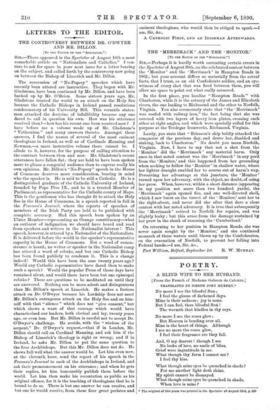LETTERS TO THE EDITOR.
THE CONTROVERSY BETWEEN DR. O'DWYER AND MR. DILLON.
L TO THE EDITOR OF THE " SPECTATOR."] SIR,—There appeared in the Spectator of August 16th a most remarkable article on " Nationalists and Catholics." I ven- ture to ask for space in your next issue for a letter bearing on the subject, and called forth by the controversy now going on between the Bishop of Limerick and Mr. Dillon.
The succession of " No-Popery" speeches which have recently been uttered are instructive. They began with Mr. Gladstone, have been continued by Mr. Dillon, and have been backed up by Mr. O'Brien. Some sixteen years ago, Mr. Gladstone treated the world to an attack on the Holy See because the Catholic Bishops in Ireland passed resolutions condemnatory of his University Bill. This versatile states- man attacked the doctrine of infallibility because any one dared to call in question his own. How was his utterance received then P—how has his recent one been received now ? I have before me a volume made up of Mr. Gladstone's " Vaticanism " and many answers thereto. Amongst these answers, I find the names of several of the most eminent theologians in Ireland, as well as of Cardinals Manning and Newman,—a more instructive volume there cannot be. I allude to it, however, for the purpose of calling attention to the contrast between then and now. Mr. Gladstone's recent utterances have fallen flat ; they are held to have been spoken more to please a congenial audience than to express really his own opinions. Mr. Dillon's "No-Popery" speech in the House of Commons deserves more consideration, bearing in mind who the speaker is. He is said to be still a Catholic. He is a distinguished graduate of the Catholic University of Ireland, founded by Pope Pius IX., and he is a trusted Member of Parliament, as representative for the Catholic county of Mayo. This is the gentleman who has thought fit to attack the Holy See in the House of Commons, in a speech reported in full in the Freeman's Journal, where the reports of speeches of members of the Irish Party are held to be published with complete accuracy. Had this speech been spoken by an Ulster Member—representing an Orange constituency—what an outburst of indignation we should have beard and read from speakers and writers in the Nationalist interest ! This speech, however, is uttered by a Nationalist of the Nationalists. It is delivered before the world in the speaker's representative capacity in the House of Commons. Not a word of remon- strance is heard; no writer or speaker in the Nationalist camp has uttered a word of rebuke, and but one Catholic Bishop has been found publicly to condemn it. This is a change indeed ! Would this have been the case twenty years ago P Would any Catholic representative have dared then to make such a speech? Would the popular Press of those days have remained silent, and would there have been but one episcopal rebuke P These are questions to be meditated on until they are answered. Nothing can be more adroit and disingenuous than Mr. Dillon's speech at Limerick. He makes a furious attack on Dr. O'Dwyer because his Lordship does not meet Mr. Dillon's outrageous attack on the Holy See and on him- self with that " silence " which does not "give consent," but which shows a want of that courage which would have characterised our leaders, both clerical and lay, twenty years ago, or even less. But Mr. Dillon is careful not to accept Dr. O'Dwyer's challenge. He avoids, with the " wisdom of the serpent," Dr. O'Dwyer's request,—that if in London, Mr. Dillon should call on Cardinal Manning. and ask him if the Bishop of Limerick's theology is right or wrong; and if in Ireland, he asks Mr. Dillon to put the same question to the four Archbishops. But this Mr. Dillon does not do. He shows full well what the answer would be. Let him even now, at the eleventh_ hour, send the report of his speech in the _Freeman's Journal to each of the Archbishops in Ireland, and ask their pronouncement on his utterance ; and when he gets their replies, let him honourably publish them before the world. Let him then make his recantation as public as his original offence, for it is the teaching of theologians that he is bound to do so. There is but one answer he can receive, and but one he would receive, from these four great prelates and
eminent theologians, who would then be obliged to speak.—I am, Sir, &c.,
A CATHOLIC FIRST, AND AN IRISHMAN AFTERWARDS.


































 Previous page
Previous page